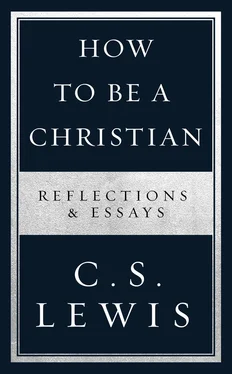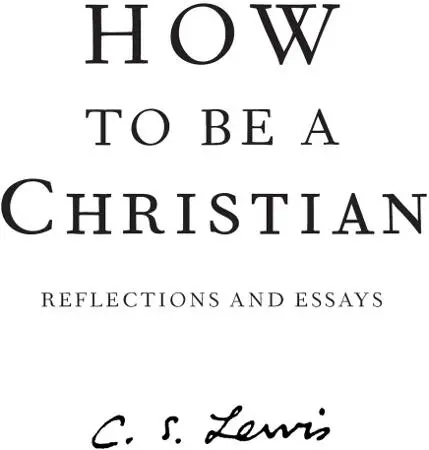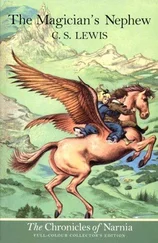
William Collins
An imprint of HarperCollins Publishers 1 London Bridge Street London SE1 9GF
WilliamCollinsBooks.com
First published in Great Britain by William Collins in 2018
First published in the United States by HarperOne in 2018
Christian Reflections. Copyright © 1967 by C.S. Lewis Pte. Ltd. Published by Eerdmans
God in the dock. Copyright © 1967 by C. S. Lewis Pte. Ltd. Published by Eerdmans.
How to be a Christian. Copyright © 2018 by C. S. Lewis Pte. Ltd. All rights reserved.
Every effort has been made to obtain permissions for pieces quoted or adapted in this work. If any required acknowledgments have been omitted, or any rights overlooked, it is unintentional. Please notify the publishers of any omission, and it will be rectified in future editions.
Cover Designer: Jack Smyth
Designed by Yvonne Chan
All rights reserved. No part of this publication may be reproduced, stored in a retrieval system, or transmitted, in any form or by any means, electronic, mechanical, photocopying, recording or otherwise, without the prior permission of the publishers.
Source ISBN: 9780008307158
Ebook Edition © August 2018 ISBN: 9780008307165
Version: 2018-07-19
Cover
Title Page
Copyright
Contents
Preface
On Working Out Your Salvation
On Being Concerned about More Than the Salvation of Souls
On the Dangers of Pointing Out Faults in Others
On Living Today While Expecting the Second Coming Tomorrow
On Forgiveness as a Necessary Practice
On Denying Oneself While Loving Oneself
On Doubts and the Gift of Faith
On the Appeal and Challenges of Home Life
On How We Spread the Christ-Life Within
On What It Means to Say, “To Live Is Christ”
On the Christian Art of Attaining Glory
On Not Feeling Threatened When Christianity Remains Unchanged While Science and Knowledge Progresses
On the Importance of Practicing Charity
On What It Means to Be Part of the Body of Christ
On Practical Matters on Being a Christian Today
Source Works
Footnotes
About the Book
About the Author
Also by C. S. Lewis
About the Publisher
CHRISTIANS SPEND A lot of time talking about beliefs and doctrines; so much so that one might think that mastering the faith is understanding a set of ideas. But that is not the case. The real substance of the faith dwells in the world of action. Christian faith becomes real when it is lived out. For example, being a Christian entails learning how to be slow to judge others and to check first the log in our own eye; how to quit focusing merely on our fears and worries in order to see how we can treat others as we would wish to be treated; how to reign in our anxieties about tomorrow and dampen our anger before it becomes a sin; how, when we are aggrieved, we forgive others.
Yes, doctrines are extremely important. Christians need to grapple with beliefs before we understand that we are empowered by Jesus to live in a new way. But understanding these ideas is a doorway, one that requires us to start walking in order for the ideas to have any meaning. Even the apostle Paul, the grandfather of most Christian theology, reminds us that faith, even if perfect, ends up a mere clanging bell if it is without love. And love can only be expressed by actions.
I say all this because (1) this is what I learned from C. S. Lewis and (2), ironically, Lewis is best known as the foremost defender of Christian ideas in the twentieth century. In other words, one might assume that Lewis might be a main cause for the notion that Christianity is essentially a body of ideas, given the success of his apologetical works, but that would be missing the nature of his ideas.
When I meet with scholars and theologians, almost all of them confess that Lewis played a significant role on their path toward their vocation. Yet, despite his popularity, when it comes to whose work scholars study, we hear the names of Barth, Hauerwas, Bonhoeffer, Wright, Pagels, Armstrong, Ehrman, and others, but seldom Lewis. I attend the annual joint conventions of the American Academy of Religion and the Society of Biblical Literature, where twenty thousand religion scholars descend on that year’s metropolis and hold sessions on every arcane subject you could imagine (and many I could not imagine), and yet I am surprised how seldom the name “C. S. Lewis” shows up on the schedule. Why is that?
I think it is because Lewis never presented his ideas as some new heroic paradigm but only as a summary of “mere” Christianity, what most Christians have always believed. And Lewis’s wisdom does not work best as a “grand theory” but rather as, what I would call, “wisdom on the journey.” In other words, it is only by walking down the path of the Christian life that what he teaches seems to make sense and become “useful.”
I still remember the light bulb going off when reading Book 4 in Mere Christianity where Lewis explains that by becoming a Christian we have signed on to the task of God making us perfect and anything short of this sometimes-painful process would be admitting that God is willing to give up on us, that God does not love us fully. Well, that ordered my young mind in a whole new way, reminding me that “becoming a Christian” was a path, not a one-time event, and that those closest to me and thus most affected by my imperfections, would be the main classroom God uses in this clean-up operation.
Another light-bulb moment was reading Screwtape’s masterful meditation on gluttony. I had always thought of gluttony as a ravenous obese soul devouring everything in his path—i.e., not me. But in The Screwtape Letters, Lewis uses the human subject’s mother and her lustful obsession with wanting “a slice of bread properly toasted” as the model of gluttony. Maybe I wasn’t as “non-gluttonous” as I had thought. It is in these moments, when dealing with the nitty-gritty of what it means to live out the Christian faith, that Lewis’s insights seem so deep, rich, and helpful.
The best example of what I am getting at comes in chapter 12 in The Great Divorce where the main character witnesses the spectacle of a heavenly parade with shining angels, saints, and animals flowing and dancing around a luminous woman who was so beautiful she was almost “unbearable” to behold. At first the observer thinks she must be Eve or Mary, the mother of Jesus. But he is told that, no, it is Sarah Smith, who lived as a suburban London housewife. In heaven, though, she is counted as one of the “great ones.” How did she get this status? Because in her ordinary life, she became mother to every young man, woman, boy, girl, dog, or cat she encountered, loving them all in a way that made them more loveable and more eager to love others.
Not only did this chapter reset my calculations of what it means to be “great” as a Christian, it also helps us to understand Lewis’s writings as whole. Lewis sought to help, encourage, and enlighten his readers about the Christian faith, especially in the ways it is seen by others as outdated or out of synch with our modern times. And in those endeavors he was masterful and more successful than he ever imagined. And part of the reason for his success was the fact that instead of desiring to be a great apologist and theologian, he measured himself by how closely he resembled Sarah Smith. And it was because of this humble approach that he did indeed, unknowingly, become a great apologist and theologian.
Читать дальше














